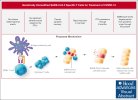Chandelier
Senior Member (Voting Rights)
Dolores Grosso, John L. Wagner, Allyson O’Connor, Kaitlyn Keck, Yanping Huang, Zi-Xuan Wang, Hilary Mehler, Benjamin Leiby, Phyllis Flomenberg, Usama Gergis, Neda Nikbakht, Michael Morris, Julie Karp, Alexis Peedin, Neal Flomenberg
Key Points
- SARS-CoV-2–specific CTLs were well tolerated in all 4 doses tested in high-risk ambulatory adults.
- ≥88% viral elimination in 92% of patients by day +4 and >99% viral elimination in everyone by day +14 on nasal swab testing.
Abstract
Cytotoxic T lymphocytes (CTLs) destroy virally infected cells and are critical for the elimination of viral infections such as those caused by the severe acute respiratory syndrome coronavirus 2 (SARS-CoV-2).
Delayed and dysfunctional adaptive immune responses to SARS-CoV-2 are associated with poor outcomes.
Treatment with allogeneic SARS-CoV-2–specific CTLs may enhance cellular immunity in high-risk patients providing a safe, direct mechanism of treatment.
Thirty high-risk ambulatory patients with COVID-19 were enrolled in a phase 1 trial assessing the safety of third party, SARS-CoV-2–specific CTLs. Twelve interventional patients, 6 of whom were immunocompromised, matched the HLA-A∗02:01 restriction of the CTLs and received a single infusion of 1 of 4 escalating doses of a product containing 68.5% SARS-CoV-2–specific CD8+ CTLs/total cells.
Symptom improvement and resolution in these patients was compared with an observational group of 18 patients lacking HLA-A∗02:01 who could receive standard of care.
No dose-limiting toxicities were observed at any dosing level. Nasal swab polymerase chain reaction testing showed ≥88% and >99% viral elimination from baseline in all patients at 4 and 14 days after infusion, respectively.
The CTLs did not interfere with the development of endogenous anti–SARS-CoV-2 humoral or cellular responses.
T-cell receptor β analysis showed persistence of donor-derived SARS-CoV-2-specific CTLs through the end of the 6-month follow-up period.
Interventional patients consistently reported symptomatic improvement 2 to 3 days after infusion, whereas improvement was more variable in observational patients.
SARS-CoV-2–specific CTLs are a potentially feasible cellular therapy for COVID-19 illness.

